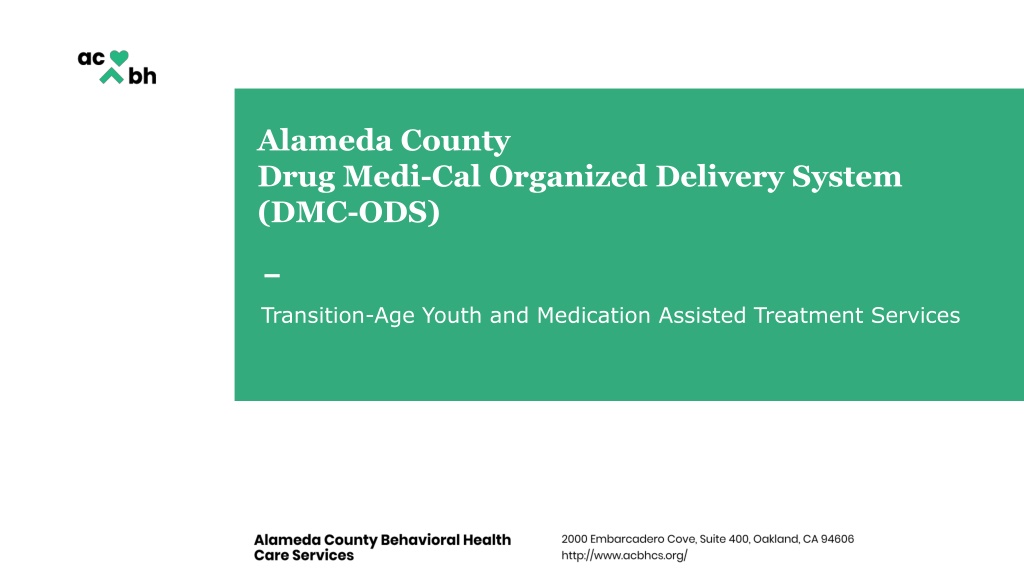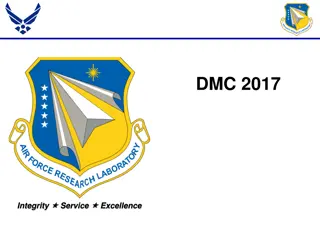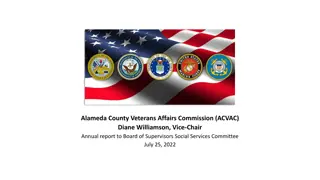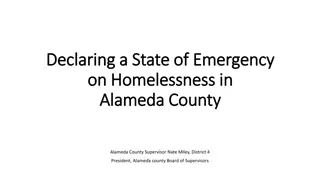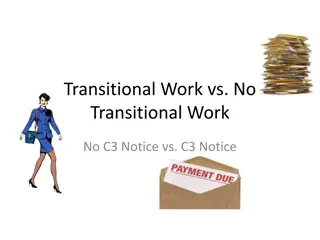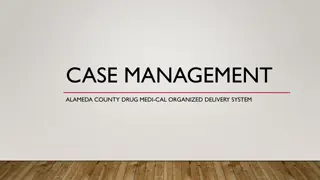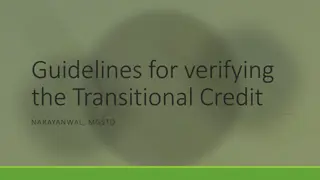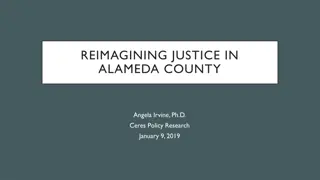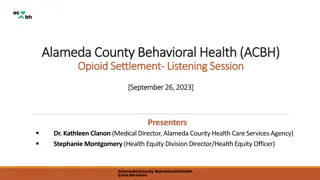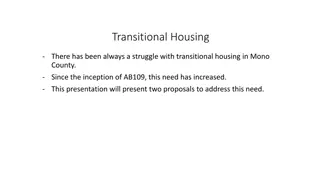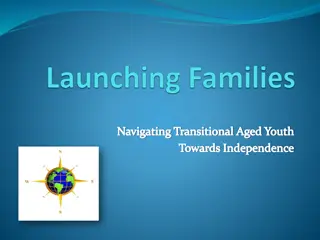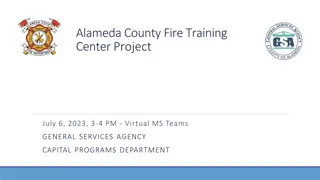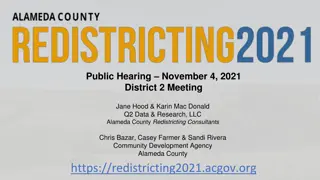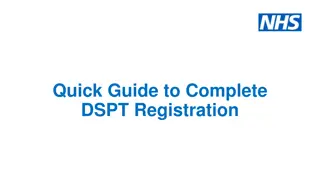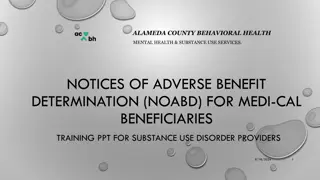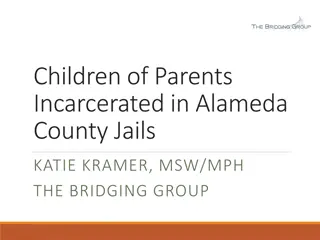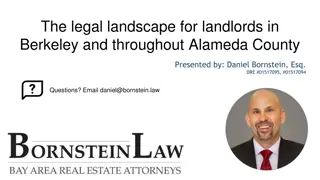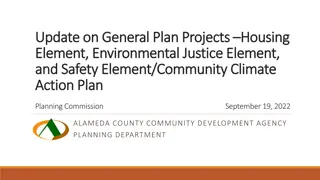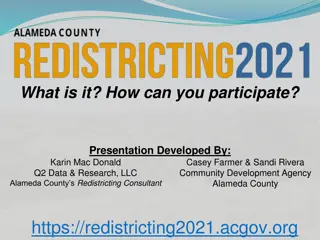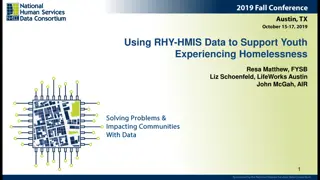Alameda County DMC-ODS Transitional Age Youth Services Overview
Alameda County Drug Medi-Cal Organized Delivery System (DMC-ODS) offers services for Transition-Age Youth (TAY) including medication-assisted treatment. Eligibility includes all Medi-Cal beneficiaries and specific clients like undocumented individuals ineligible for Medi-Cal. TAY are aged 16-24 and receive specialized services held to specific practice standards. Services are offered for both adolescent and adult beneficiaries, with programs tailored to meet their needs in various locations within Alameda County.
Download Presentation

Please find below an Image/Link to download the presentation.
The content on the website is provided AS IS for your information and personal use only. It may not be sold, licensed, or shared on other websites without obtaining consent from the author. Download presentation by click this link. If you encounter any issues during the download, it is possible that the publisher has removed the file from their server.
E N D
Presentation Transcript
Alameda County Drug Medi-Cal Organized Delivery System (DMC-ODS) Transition-Age Youth and Medication Assisted Treatment Services
Who is eligible to receive SUD services? All Medi-Cal Beneficiaries In addition, SUD System has funding set aside to serve the following clients: Undocumented clients who are ineligible for Medi-Cal Eligible for Medi-Cal, not enrolled at time of treatment Out-of-county Medi-Cal in process of switching to Alameda County 2
TAY Overview Transitional-Age Youth > TAY are between the age of 16-24 years old > Served in both Adolescent (up to 21y) and Adult programs (18+y) > TAY designated program are held to a specific TAY practice standards 4
Services for Adolescent beneficiaries (12-21y) Adolescent Outpatient, Intensive Outpatient & Recovery Support Services (3 clinics; 19 High schools; 2 JCs) City of Fremont: Youth and Family Services (Fremont) Horizon Project Eden Adolescent Services (Hayward) La Familia Projecto Primavera (Oakland) Camp Sweeney & Juvenile Justice Center Juvenile Hall Adolescent Residential Treatment New Contract Coming Soon! Therapy groups, anger management, relapse prevention, and one-on- one time with a recovery counselor 5
Services for Adult beneficiaries (age 18+) Adult Outpatient, Intensive Outpatient & Recovery Support Svs. (10) Coming Soon! - Provider specializing in Asian/Pacific Islander services (Union City) Alameda Health Systems: Highland Hospital (Oakland) Bi-Bett East Oakland Recovery Center (East Oakland) Horizon Project Eden (Pleasanton) La Familia: Latino Family Services (Fruitvale/Oakland) Options Recovery (Berkeley, West Oakland, San Leandro, Santa Rita) Second Chance (Hayward & Newark) 6
Transitional Age Youth (TAY) Practice Standards Developed and released on November 1st, 2019 These standards support the ACBH TAY 5 Pillars of Care where TAY are physically and mentally healthy, have a place to call home, have enough money to support themselves, are able to reach their highest educational and vocational potential, and are valued and connected to community. These standards are comprised of 5 categories for consideration: > Practice Requirements > Field Based Services > Outreach > Workforce/Staff Development > Clinic Facility 7
TAY Practice Standards Continued Practice Standards > In TAY designated outpatient programs, at least one specialized treatment group for TAY must be offered and conducted no less than once per week. > Must practice at least 2 of the following: ~Harm Reduction ~Co-Occurring conditions ~Trauma Informed Care ~7 Challenges for both adolescents and young adults > Family services need to be offered and extended, and not overlooked as important resources for TAY clients in SUD treatment. > ACBH strongly recommends the adoption of specialized social media platforms, mobile phones and telehealth 8
TAY Practice Standards Continued Practice Standards, Continued >TAY designated SUD programs should, as part of treatment, address clients workforce readiness and provide or link to resources for: ~Education support ~Job readiness skills ~Soft people skills ~Culturally specific tools > TAY designated SUD programs need to be prepared to offer additional case management services for TAY who may need extra support navigating complex service delivery systems > Warm linkage to transportation resources > Physical Health / Mental Health /SUD assessment that includes ASAM areas unique to TAYs based on developmental stages of TAYs > Whenever possible, the program should utilize TAY peers 9
TAY Practice Standards Continued Field Based Services > Providers must be able and willing to provide field-based treatment to TAY beneficiaries who may be reluctant or unable to access clinic-based substance use services > Providers should be willing and able to engage TAYs in structured, community based social activities Outreach > On an annual basis, TAY designated programs will provide a written TAY outreach plan that describes ~How the SUD program will be marketed to TAYs ~How TAYs will learn about services available within the SUD program > Providers will develop a TAY specific brochure 10
TAY Practice Standards Continued Workforce/Staff Development > Providers must be able and willing to provide field-based treatment to TAY beneficiaries who may be reluctant or unable to access clinic-based substance use services > Providers should be willing and able to engage TAYs in structured, community based social activities Clinic Facility > On an annual basis, TAY designated programs will provide a written TAY outreach plan that describes ~How the SUD program will be marketed to TAYs ~How TAYs will learn about services available within the SUD program > Providers will develop a TAY specific brochure 11
TAY Practice Standards Continued Workforce/Staff Development >Staff should have a minimum of two years of experience working with TAY, >Staff should be able to identify with clients through shared lived experience as a TAY being served in SUD services. >Training on the developmental stages of adolescents and young adults, Motivational Interviewing, and Trauma Informed CBT. >Cultural specific trainings, such as Gender Fluidity training >TAY focused SUD workshops with Mental Health TAY providers >Knowledge and experience involving primary care integration >TAY Peer support specialists (strongly consider using peers in recovery support services) 12
TAY Practice Standards Continued Clinic/Facility >Space should be aesthetically inviting for TAYs (e.g. pictures of TAYs in lobbies, modern d cor and design) >Space should be Trans/Fluid friendly >Space should include hangout and safe spaces for socialization >TAY brochures (e.g. SUD, Mental Health, others) posted in lobby or common room spaces, &/or resource tables available within the clinic >Easily accessible by public transportation >Offer or be near support services such as childcare, shelter, dining 13
TAY Division Slide MISSION To improve services and outcomes for youth, ages 16-24 who are experiencing or at risk of serious behavioral health challenges, in making successful and seamless transitions towards maximum self- sufficiency and independent living, in collaboration with TAY and their families. In 2016, TAYSOC, hosted a series of strategic brainstorming and listening sessions, in collaboration with PEI and Public Health s-CAPE unit to create five targeted results. Efforts were centered around methods of Results Based Accountability (RBA) Performance and Delivery of services. How much did we do? How well did we do it? Is anyone better off? Resulting in the TAY 5 Pillars of Care as a practice approach with appropriately referring TAY to mental health services. ** FY 18-19: 5,131 TAY were served throughout ACBH 14
Developmentally Appropriate Services for TAY Recognizes clients are in discovery (vs. recovery) stage Assists in expanding world view Supports in developing new skills and competencies (in-vivo training) Trauma-informed Encourages future planning while being aware of the importance of now Involves family of choice and other natural supports Supports meeting basic survival needs Maximizes safety and confidentiality 15
How to Refer into DMC-ODS? Adolescent (18 and younger) All Adolescent SUD services Self or direct referrals to all Adolescent SUD Services can be made by Self/Parent or Caregiver, Healthcare provider, CWS, Juvenile Probation, or Schools Adult (18 and older) Residential or Recovery Residence Referrals MUST go through one of 4 DMC-ODS access points Outpatient/Intensive Outpatient/Recovery Support or Opioid Treatment Self or direct referrals, or by one of 4 DMC-ODS access points 16
MAT Overview Medication Assisted Treatment > MAT is for individuals with Opioid and/or Alcohol use disorders who need pharmacological support in addition to therapy > Served in our Opioid and Outpatient Treatment Programs > Covered medications include: ~Methadone ~Buprenorphine ~Buprenorphine-Naloxone Combo ~Disulfiram ~Naloxone (NARCAN) 18
Services for Adult beneficiaries (age 18+) Adult Outpatient, Intensive Outpatient & Recovery Support Svs. (10) Coming Soon! - Provider specializing in Asian/Pacific Islander services (Union City) Alameda Health Systems: Highland Hospital (Oakland) Offers MAT Bi-Bett East Oakland Recovery Center (East Oakland) Horizon Project Eden (Pleasanton) La Familia: Latino Family Services (Fruitvale/Oakland) Offers MAT Options Recovery (Berkeley, West Oakland, San Leandro, Santa Rita Offers MAT) Second Chance (Hayward & Newark) Opioid Treatment Provider (Medication Assisted Treatment) (7) Berkeley Addiction Treatment Center (Berkeley) Addiction Research and Treatment (Oakland) Humanistic Alternatives to Addiction Treatment (Oakland, Hayward) MedMark (Hayward) Lifeline (Oakland) West Oakland Health Council (Oakland) 19
Medication Assisted Treatment (MAT) ACBH provides MAT through two treatment modalities > Opioid Treatment Providers > Outpatient Treatment Providers Opioid treatment providers (OTPs) historically only provided Methadone, as part of the DMC ODS, they now also provide other forms of MAT such as Buprenorphine, as well as additional services such Case Management ACBH has partnered with two Outpatient providers (AHS and La Familia) to be MAT champions via a MAT Expansion Grant Learning Collaborative > The goal of the learning collaborative is to build capacity among outpatient providers to offer MAT services, in addition group therapy >As part of La Familia s participation, the continuum of care is building capacity to serve youth who need MAT to the standard individual and 20
Medication Assisted Treatment (MAT) Our Santa Rita Jail-based outpatient program (Options) is also building MAT capacity by partnering directly with the jail s OTP for referrals to the program > ACBH is working directly with WellPath to ensure that all staff know how to access MAT for clients being released from Santa Rita Jail County Touchpoints Initiative >ACBH, WellPath and Probation partook in a learning session >HMA developed a training curriculum for Justice involved staff >ACBH added how to access MAT services in the county ~Partnering with Probation to train staff >MAT champions within Probation and ACSO/WellPath staff 21
Center Point Criminal Justice Case Management Santa Rita & Probation Offices Screenings for justice-involved individuals, and Case Management for Probation Clients Santa Rita Jail Contact Deputy Greg McLean to get client on the screening list gmclean@acgov.org Oakland and Hayward Probation Offices Sign client up for screening and input referral into Tyler Supervision 22
Substance Use Access and Referral Helpline Substance Use Access & Referral Helpline 1-844-682-7215 Publicly accessible portal 20 minute phone screening Assigns care navigator to support transition through SUD treatment system With client s permission, health care provider or anyone may be on call with beneficiary to support the screening process Hours: Monday Friday, 8am-9pm Screenings for Adult 18+ only 23
Resources Substance Use Access and Referral Helpline Brochure (in all threshold languages) & Brochure on Improvements to the Alameda County SUD System (in all threshold languages): http://www.acbhcs.org/substance-use- treatment/ SUD Provider Directory: http://www.acbhcs.org/provider_directory/ Alameda County Behavioral Health Grievance and Appeals: http://www.acbhcs.org/consumer-grievance/ 24
Jacqline Murillo, MPH, MSBH DMC ODS Consultant Jacqline.Murillo@acgov.org Shannon Singleton-Banks, MPH Program Services Coordinator, TAY Shannon.Singleton-Banks2@acgov.org 25
